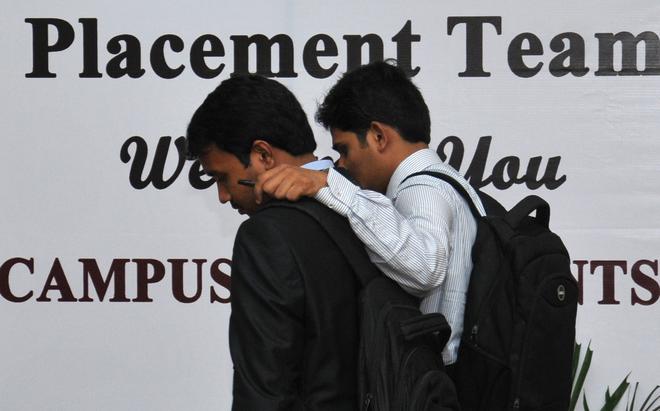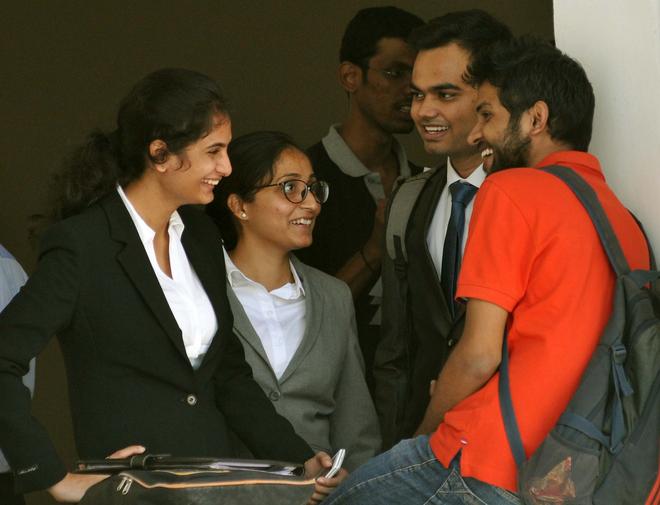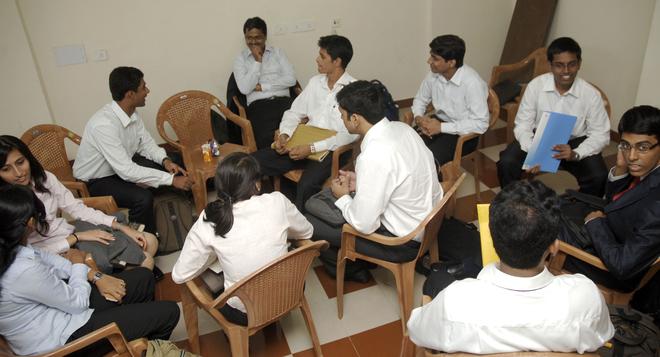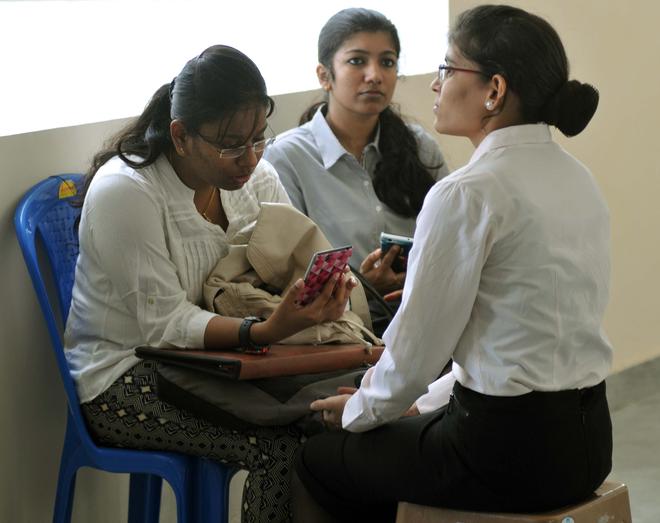Last September, during the second quarter of the academic year 2023-24, college placement cells were concerned that students graduating in May 2024 would face a challenging time, as companies were cutting back on hiring. They were anticipating lower placement scenarios, as the Information Technology (IT) industry sector had been expecting a turbulent phase, and was risk averse.
Some industry observers blamed the Covid-19 pandemic- induced lockdown for having robbed from students, the opportunity for hands-on experience and the developing of interpersonal skills at workplace settings. K.E. Raghunathan, national chairman, Association of Indian Entrepreneurs, observed that placements drives would have been better but for the pandemic. “The present batch of students underwent at least one year under the Covid-19 lockdown phase, where they lost practical experiences and missed out on in-person classes, affecting their interpersonal and communication skills,” he said.
Most students depend on campus placements, as such recruitments ensure a higher pay scale as compared to direct walk-ins and through Human Resources (HR) consultancies. Campus placements have been a disappointment however, for engineering students this year, who had centred their hopes on landing a job in an IT company. Four years ago, when these students enrolled for an engineering degree, the IT industry was hiring from campuses in bulk, but not this year. Colleges report that while compared to previous years, the number of IT campus placements have come down, companies are now focusing on specialised skill sets among students. Even in arts and science colleges, students who took up technical courses and commerce graduates followed by those from science disciplines, have had it better than engineering students, said placement officials.
The downturn in the IT industry will impact students across engineering courses, experts said. Students pointed out that the IT sector not only pays well, but also gives several allowances and increments. Therefore, students who chose streams such as mechanical and civil engineering are equally concerned. A mechanical engineering student at a city college said: “IT firms hire students from across departments. So even if we don’t get placed in the core sector, we had always believed we would have IT as a second option.”
Advantage skill sets
Director of the Centre for University Industry Collaboration, Anna University, K. Shanmugasundaram, said IT companies such as Tata Consultancy Services (TCS) and Wipro, who generally recruit in large numbers, had their own selection process and did not come to campuses this year. However, core companies that planned to establish plants in the State and those developing products, had come. “The companies decided to select 250 engineers from India. At Anna University we had only 60 students with the required skills and of these, 70% have been placed,” he said.

The University conducted a pooled placement programme for its 16 constituent colleges. “Smaller companies wanted a larger pool, and so, we held pooled placement drive,” he said. At Anna University, of the 1,700 eligible candidates for placement 1,125 (60%) have received an offer. On average, 90% of undergraduate students in all IT and circuit branches have been placed, varsity officials said.
This year, about 95% of students in Compute Science Engineering (CSE) and IT, as well as exclusive branches such as printing, biotechnology and mining also received offers. Around 70% of students in the ceramic engineering department were hired as well, Mr. Shanmugasundaram said.
The minimum annual salary offered this year was ₹7 lakh. Public sector undertakings, construction companies and banking and management firms also visited the university. Candidates who did not have knowledge of Artificial Intelligence (AI) and Data Science (DS) and Python could not be placed, he pointed out.
Around 30 companies claimed they could not find qualified candidates on campus, Mr. Shanmugasundaram said. “The students did not have the skills that these companies demanded. They wanted candidates with strong fundamental knowledge of Python and advanced knowledge in AI and DS,” he said.
The university relied on its alumni to offset the damage that could have occurred with low student campus placements. Alumni managed to place around 500 students. A job fair for students with arrears has been proposed to be held in mid-May, again, with alumni support.

Students on their part, are not veering towards startups. “The charm of the money that startups used to offer has fallen in the past three years. The startups too, have not shown interest, because they are apprehensive as to whether they will receive continued financial investments,” Mr. Shanmugasundaram surmised.
At affiliated autonomous engineering colleges, the placement season showed similar trends. Arun Ramaswami A., Dean, (Corporate Relations and Higher Studies), Velammal Group of Colleges Chennai and Madurai, said nearly 200 companies visited the campus. “Placement crossed 94% with the average salary between ₹6 lakh and ₹10 lakh. Currently, final exams are on. After the second week in June, a few more companies will start the hiring process,” he said. Service, product, core engineering, IT and IT Enabled Services (ITeS) as well as structural and construction companies visited the campus, he said.
Global Capability Centres step in
Industry experts say historically, IT companies have preferred to recruit from Tamil Nadu, but recession has kept them away this year. A new entrant, Global Capability Centres, for different companies, has filled the vacuum, however. Multinational firms such as CMA CGM, DHL, Maersk and Mediterranean Shipping Company, Hpag Lloyd and United Parcel Service have already established GCCs in the State. Former All India Council for Technical Education (AICTE) member and former Chief Managing Director of Cognizant India, Ramkumar Ramamoorthi said newer trends were emerging now. “As business demand is through the year, off-campus hiring has taken off in a big way and is here to stay,” he explained. Tepid revenue growth has resulted in large IT services companies giving campus hiring a miss or reducing intake. This has been partially offset by GCCs, however, he pointed out.
Also, as GCCs are ramping up IT and BPO (business process outsourcing) operations, students from across disciplines, including liberal arts, paramedical and management studies, will be hired. At the Vellore Institute of Technology (VIT) for instance, over 300 GCCs visited the campus for broad-based hiring.

Global companies across industries such as energy, semiconductor, defence, automotive, medical devices and the pharma sector have chosen India for research and development, design, and manufacturing, Mr. Ramkumar pointed out. Students from STEM (science, technology, engineering and math) campuses across disciplines of study and those aligned to core disciplines of study that these companies specialise in have been chosen, he added.
“Alumni are the biggest brand ambassadors for any educational institution, and they play a crucial role in hiring talent. Where the alumni are founders or key decision-makers in companies, the relationships run deep,” Mr. Ramkumar explained.
G.K. Raajesh, placement officer of Thiagarajar College of Engineering, Madurai, said more interns were being recruited now. “The responsibility lies on the students to convert this internship opportunity into full-time employment, based on their performance during the internship,” he said. The college had reached out to its alumni to visit the campus for recruitment. Over 550 students from the college had been placed this year, he said.
Arts and science colleges
At arts and science colleges too, placements have been challenging this year, and alumni support is being sought. Madras Christian College principal P. Wilson said 605 students had been placed as audit and tax associates, management trainees, and HR associates. Arun Mozhi G., training and placement officer of Thiagarajar College (Arts and Science) Madurai, said companies such as Accenture, TCS, HCL Technologies, Hexaware and Deloitte had visited their campus. “Two-thirds of the students in the commerce, Computer Science/IT/Computer Applications and Business Administration streams were placed,” he said.
Representatives of Presidency College and D.G. Vaishnav College said banking sector companies recruited in good numbers. However, both institutions claim they have fallen back on the support of their alumni. “Our alumni helped at least 100 students to get placements in reputable companies,” said R. Raman, principal of Presidency College. Principal Santhosh Baboo said the alumni supported the students with internship and pre-placement drives to prepare students.
Colleges say companies have made the selection rigorous by replacing conventional numerical/quantitative aptitude test with cognitive assessment tests that include abstract and critical reasoning and verbal ability. Some companies use games to assess students, Mr. Arun Mozhi said, adding: “They encourage students to not prepare specifically for their assessments so that they can evaluate the natural talent of the candidates.”
T.N. is still preferred destination for recruiting companies
Aditya Narayan Mishra, managing director and chief executive officer of Ciel HR Services, said: “The tech sector’s downturn has led to a significant decrease in campus hiring activity. However, we are witnessing a notable trend in campus hiring across Tamil Nadu, where recruiters are prioritising specific skill sets and preferring only the ‘cream of the batch’. This is yet another factor contributing to the reduction in mass hiring practices.”
New segments that are hiring actively are the telecommunication and electric vehicle sector. Global head of TCS’s Talent Acquisition and Academic Interface, Girish Nandimath, said the State accounted for a significant proportion of freshers hired. “The region continues to be a source of quality talent over the years and this year is no different,” he remarked.

“We continue to partner with engineering and non-engineering colleges for various roles as per demand. There is a demand for trainees who can learn and adapt fast, to core technology as well for those in non-engineering spaces such as cognitive business, financial and insurance domain specific roles,” Mr. Nandimath noted. He is confident about the talent from the pool of students in campuses in Tamil Nadu. “We find that students from the region are tech savvy and are eager to learn more. We have been hiring students across the spectrum of qualifications from Tamil Nadu over the years, such as engineering, science, commerce, design, management and pharmacy. And we shall continue to do so given the quality intake from the region for our requirements,” he said.
Colleges must do more homework to ensure better placement said K.E. Raghunathan. Placement officers must apprise themselves about volatile market conditions, the quality of knowledge that the students have acquired, understand market requirements and equip students with new technology, he observed.







